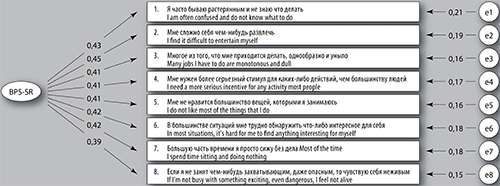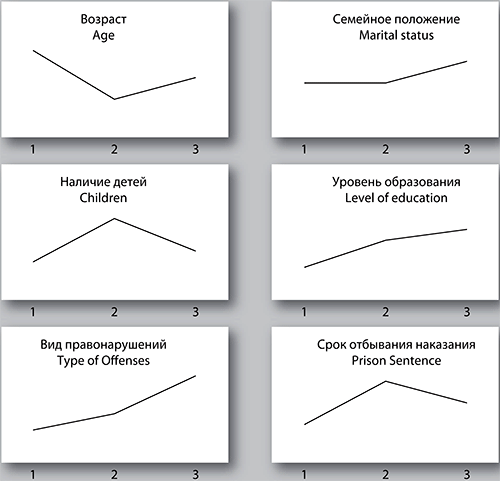Article
Zolotareva A.A. (2020). Measurement of boredom proneness: Russian adaptation of the BPS-SR. National Psychological Journal, [Natsional’nyy psikhologicheskiy zhurnal], (13)1, 40–49.
Abstract
Background. The BPS-SR (Boredom Proneness Scale-Short Form) is a brief and most efficacious version of the famous Boredom Proneness Scale developed by R. Farmer and N. Sundberg (Struk, 2017).
Objective. This study is aimed to adapt the Russian BPS-SR version.
Design. Psychometric indicators of the Russian BPS-SR version have been assessed on the sample of males (N=151) serving sentences in prison.
Findings. The factor structure of the BPS-SR, estimated using exploratory and confirmatory factor analyses, has demonstrated the scale homogeneity and thus confirmed the original BPS-SR authors’ hypothesis suggesting the advantage of the scale comprising only direct test items. The BPS-SR reliability (α-Cronbach=0.86) and validity indicators also have confirmed the psychometric adequacy of the Russian scale adaptation. The boredom proneness has proven to be positively associated with apathy, hopelessness, loneliness and male depressive syndrome, which allows considering it a possible factor in psychological maladjustment as an adult. The social and demographic characteristics evaluation performed using the one-way analysis of variance ANOVA has showed that age, marital status, having or not having children, offense type and sentence term do not significantly contribute to the boredom proneness, while the BPS-SR indicators depend directly on the respondents’ education. The respondents having obtained the higher and specialized secondary education have proven to be less prone to boredom than respondents having the basic secondary or full secondary education.
Conclusion. The conclusion infers that the adapted BPS-SR can actually be considered a psychometrically reasonable means to diagnose boredom proneness in Russianspeaking respondents.
Accepted: 02/15/2020
Pages: 40-49
DOI: 10.11621/npj.2020.0104
PDF: Download
Keywords: boredom proneness; apathy; hopelessness; loneliness; depression;
Available Online 31.03.2020
Table 1. Factor structure of the Russian BPS-SR version (based on EFA results)
|
Questionnaire Statements |
Factor load |
|
|
1. |
I am often confused and do not know what to do. |
0.72 |
|
2. |
It’s hard for me to entertain myself with anything. |
0.46 |
|
3. |
Many jobs I have to do are monotonous and dull. |
0.43 |
|
4. |
I need a more serious incentive for any action than most people. |
0.46 |
|
5. |
I do not like most of the things that I do. |
0.48 |
|
6. |
In most situations, it’s hard for me to find anything interesting for myself. |
0.55 |
|
7. |
Most of the time I spend time sitting and doing nothing |
0.47 |
|
8. |
If I’m not busy with something exciting, even dangerous, I feel not alive. |
0.55 |
Table 2. Indicators of convergent validity of the Russian BPS-SR version
|
Variables |
Boredom Proneness |
|
|
1. |
Apathy |
0.32 (p<0.001) |
|
2. |
Experiencing hopelessness |
0.41 (p<0.001) |
|
3. |
The experience of loneliness |
0.43 (p<0.001) |
|
4. |
Male Depressive Syndrome |
0.42 (p<0.001) |

Fig 1. Factor structure of the Russian BPS-SR e version (based on CFA results)

Fig 2. Influence of socio-demographic characteristics on boredom proneness according to the Russian BPS-SR version
NB: Age: 1 = “respondents under 30 years old.” 2 = «respondents aged 30 to 40 years.» 3 = «respondents over 40 years old.» Marital status: 1 = “single”. 2 = «married.» 3 = «divorced.» Children: 1 = «no children.» 2 = «there is 1 child.» 3 = «there are 2 or more children.» Level of education: 1 = «incomplete secondary education or general secondary education.» 2 = “secondary specialized education”. 3 = «higher education.» Type of offense: 1 = “economic crimes”. 2 = «crimes against public health and public morality.» 3 = «crimes against the person.» Prison sentence: 1 = «less than 1 year.» 2 = «from 1 to 10 years.» 3 = «over 10 years.»
Acknowledgments
The article was prepared within the framework of the Basic Research Program at the National Research University Higher School of Economics (HSE) and supported within the framework of a subsidy by the Russian Academic Excellence Project ‘5-100.
For citing this article:
Zolotareva A.A. (2020). Measurement of boredom proneness: Russian adaptation of the BPS-SR. National Psychological Journal, [Natsional’nyy psikhologicheskiy zhurnal], (13)1, 40–49.


